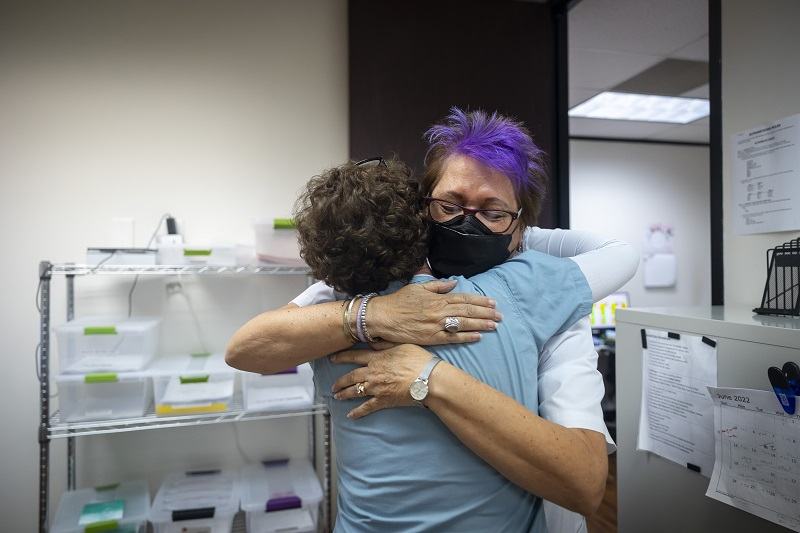
Clinic founder and director Kathy Kleinfeld hugs patient advocate Marjorie Eisen at the close of a long day at the Houston Women’s Reproductive Services clinic on Friday.
17:41 JST, June 25, 2022
HOUSTON – The phones started ringing, as they always did, moments after Houston Women’s Reproductive Services opened for business at 9 a.m. on Friday — with patients in need of abortions calling to secure a spot on the schedule.
Then, 12 minutes later, it all came to a stop. The Supreme Court had overturned Roe v. Wade.
“Can we still do abortions today?” asked patient advocate Marjorie Eisen, thinking about the 20 women they had booked for appointments.
Several were already in the waiting room, scrolling through their phones as they waited.
“No,” said Kathy Kleinfeld, a co-owner of the clinic. “We’re done.”
A silence settled over the staff as they reckoned with the stunning news — and what it would mean for the patients they served every day.
For the first time since 1973, Americans would not have a constitutional right to abortion. The seismic ruling will transform life for millions of women years into the future. But on this steamy Friday morning in Texas, it came as an abrupt, life-altering change for the patients who would sit down in the waiting room that day, thinking they had found a solution to their unwanted pregnancies.
The state had already banned abortions at six weeks, but the end of Roe reinstituted an existing all-out ban enacted before the landmark precedent, making it instantly illegal for the doctors at the clinic to perform the procedure. And while the clinic’s lawyers plan to challenge that law in court, the most they can do is buy the clinic a little more time: In 30 days, a trigger ban will take effect in Texas, banning abortions across the state.
Suddenly, the staff had to decide what to tell their patients. Some of the women on the schedule that day had kids, others didn’t. They were White, Black and Hispanic. At least one had driven hundreds of miles to get to Houston, because the lone clinic in her home state of Mississippi was scheduling appointments several weeks out – and she wanted to put her pregnancy behind her.
Kleinfeld began taking the women out of the waiting room, one by one, to deliver the news.
The second woman she spoke to walked out of the clinic in tears.
Since she opened Houston Women’s Reproductive Services in 2019, Kleinfeld had worked hard to create a space where her patients would feel comfortable. She keeps a vase of lilies in the waiting room and lines the walls with motivational posters in various pastel shades.
As Kleinfeld told patients about the ruling, a Spotify playlist called “Peaceful Guitar” played in the background.
Meanwhile, other patient advocates turned to the phones: They had 35 scheduled patients to call.
Eisen, who had worked in abortion care for 30 years, hadn’t really prepared for this moment. Even after a draft of the decision leaked in May, she hadn’t wanted to believe Roe could really fall.
“We don’t even know what states to send them to,” Eisen said, talking to the other patient advocates. “California?”
She looked over a map of America, the states with abortion bans shaded gray, then picked up the phone. She would start with the earliest appointments and work her way through the afternoon, she decided: Better to minimize the number of patients they had to turn away in person.
One of the first patients on the list was Victoria, a 25-year old single mother who was five weeks into her pregnancy.
Victoria, who spoke to The Washington Post on the condition that only her first name be used to protect her privacy, was 30 minutes away from the clinic when she got the call, stopped at a red light. As soon as she heard the news, she said, she broke down crying, trying to figure out what she would do now.
“There are a lot of women who just can’t,” she later said in an interview. “And right now I just can’t.”
Even though she couldn’t get her abortion, Victoria decided to come into the clinic to talk through her options. The staff gave her a magazine article about ordering abortion pills online and mentioned a few states where the procedure was still legal.
New Mexico. Colorado. Florida. Illinois.
Victoria would have to line up child care, she said, and ask for extra time off work. She would be able to cover her travel expenses, but just barely: After her abortion, she said, she’d be back living “paycheck to paycheck.”
The news was particularly painful, Victoria said, because she’d found out about her pregnancy so early. As restrictive as Texas’s six-week ban had been, she said, she’d still managed to “beat it.”
“I’m five weeks, there’s no heartbeat.” And still, she said, “my rights were just taken.”
After Victoria left the clinic, Eisen continued to move through her calls. Some of the patients took the news in stride, calmly asking questions about various clinics in other states. Others asked if she was sure about the ruling. One begged.
“I can pay extra,” the woman said.
“It’s not an issue of expense,” said Eisen. “It’s just an issue of legality.”
The phones kept ringing through much of the morning with new patients calling to schedule appointments, completely unaware of the Supreme Court’s ruling. Eisen and others kept repeating the same message: We have a decision from the Supreme Court. Think about who you might be able to stay with in other states. It’s devastating. I’m so sorry.
Finally, Kleinfeld decided that she needed to record a new outgoing message.
“I’m sorry to report that as of today, Friday, June 24, 2022, Roe v. Wade, the right to legalized abortion, has been overturned,” Kleinfeld recited. “As of today, we are no longer able to provide abortion services.”
She paused, then added one more thought.
“We hope you all remember this when it’s time to vote.”
Turning away patient after patient, Kleinfeld was frustrated by how little help she could offer. When the Texas abortion ban took effect in the fall, she had sent patients to a sister clinic in Oklahoma. When Oklahoma banned abortions in the spring, she diverted them to providers in New Mexico or Colorado.
Now, most of the Southeast and Midwest would be dark.
All morning, Kleinfeld had been handing out copies of a Ms. Magazine article titled “People Are Getting Creative Obtaining Abortion Pills Online,” which outlined various places to buy abortion pills — both legally and illegally. She marked “Aid Access” with a yellow highlighter, drawing attention to an Austrian-based organization run by Dutch physician Rebecca Gomperts, which mails abortion pills to all 50 states, including many states that have banned abortion by mail.
She couldn’t advise people to order abortion pills illegally online, Kleinfeld said with a smile — but she could hand out recommended reading.
The doorbell rang, and Kleinfeld looked over at their external video camera.
Another patient was waiting to come in.
Top Articles in News Services
-

Prudential Life Expected to Face Inspection over Fraud
-

Hong Kong Ex-Publisher Jimmy Lai’s Sentence Raises International Outcry as China Defends It
-

Japan’s Nikkei Stock Average Touches 58,000 as Yen, Jgbs Rally on Election Fallout (UPDATE 1)
-

Trump Names Former Federal Reserve Governor Warsh as the Next Fed Chair, Replacing Powell
-

Suzuki Overtakes Nissan as Japan’s Third‑Largest Automaker in 2025
JN ACCESS RANKING
-

Japan Institute to Use Domestic Commercial Optical Lattice Clock to Set Japan Standard Time
-

Israeli Ambassador to Japan Speaks about Japan’s Role in the Reconstruction of Gaza
-

Man Infected with Measles May Have Come in Contact with Many People in Tokyo, Went to Store, Restaurant Around When Symptoms Emerged
-

Prudential Life Insurance Plans to Fully Compensate for Damages Caused by Fraudulent Actions Without Waiting for Third-Party Committee Review
-

Woman with Measles Visited Hospital in Tokyo Multiple Times Before Being Diagnosed with Disease




























